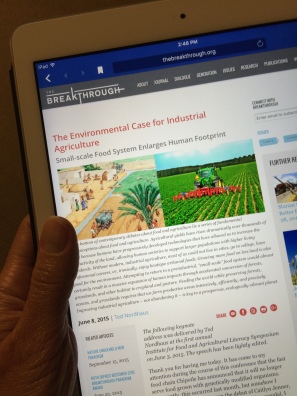I think my husband heartily regrets the day he surprised me with my first smartphone. Why? I enjoy reading about science, and I quickly discovered that a world of knowledge was Literally. At. My. Fingertips.
There was a day when I would readily lose myself in a book or a magazine article. Not so much anymore. Now I have my phone, or my tablet! I can still shut out the rest of the world within moments by stumbling across an interesting article posted on Facebook by Science News, Biofortified, or dozens of other science or ag organizations.

Links to thought-provoking science and ag-focused articles abound on social media, but the comments can be caustic.
The pitfall of following science news sources online, though, is the comments sections. Back in the day, if you read an article about a new science discovery in a paper magazine, you might discuss what you just read with someone nearby. But that was pretty much it.
But now! We have the ability to comment immediately, online, about everything! See a headline that grabs your attention? Click! Read! Comment! Oh wait… I know what I think just by the headline; I don’t need to read the whole story. In fact, I’m going to post a comment expressing what I think [types feverishly…]. There.
Have you ever furtively Googled a texting/commenting abbreviation because you didn’t know what it stood for? Yeah, me too. Last week I looked up this one: tl;dr. If you’re old like me (I’m in my mid-40s, which feels dang old if you spend any time in the social media world), you may not have known that one. I’ll save you looking it up. It means, “too long; didn’t read.” Raise your hand if you’ve ever posted a comment on an article you didn’t read all the way through, or (ahem) didn’t read at all. Go on, raise that hand, no one’s watching you. (Seriously—they’re all looking at their devices.)
I’ve actually caught myself gauging whether or not I want to take the time to read an article by perusing the comments first. I’m not sure this is a healthy habit, and I have yet to discern what it is about the comments that help me make up my mind. Whatever it is, reading online comments is an interesting and often depressing foray into human nature.
Judging by what I read in online comments, a whole bunch of people’s moms must have told them as children, “If you can’t say anything nice, don’t say anything at all. Unless you’re online, then you may type whatever the #%&! you want.” The mean stuff bothers me, of course. I remind myself that there just SEEMS to be a lot of hateful trolls, but (hopefully) they are a small minority of folks who make a lot of racket.
The commenters who irritate me most, however, aren’t the trolls who simply thrive on poking people to get emotional reactions. No, it’s the people who casually make snide comments who really disappoint me.
Want to fall into a comment abyss? Read the comments regarding a topic like pesticides or GMOs. Along with outright hateful statements, you’ll run into stuff like this: “Know anything about how toxicology works?” And, “Science, much?” I think the reason these more subtle jabs irk me so much is that they often come from people who otherwise share valuable, credible information. Then they ruin it by being snide. It’s as though they care more about being right than about advancing the conversation.
Here’s something to keep in mind if you’re commenting online. The people “listening” aren’t just the ones commenting. A whole bunch of folks like me are reading quietly, taking in information, and deciding for themselves who and what to believe. And they won’t say (type) a word.
Relationship researcher John Gottman found that contempt is a key predictor of whether or not a marriage will last. I believe this is also true of the often invisible interactions that take place online. It doesn’t matter how much valuable information you can share; if you present it with even the tiniest bit of scorn, readers will “divorce” you and stop listening.
If you really want to maintain a happy “marriage” between your ideas and the people you hope to share them with, online or IRL (in real life), restrain yourself from being sarcastic. Truly. Just be nice. I’m listening.
This post also appeared as the “Stray Kernels” column in the April/May 2016 issue of DeKalb County Farm Bureau’s Connections magazine.